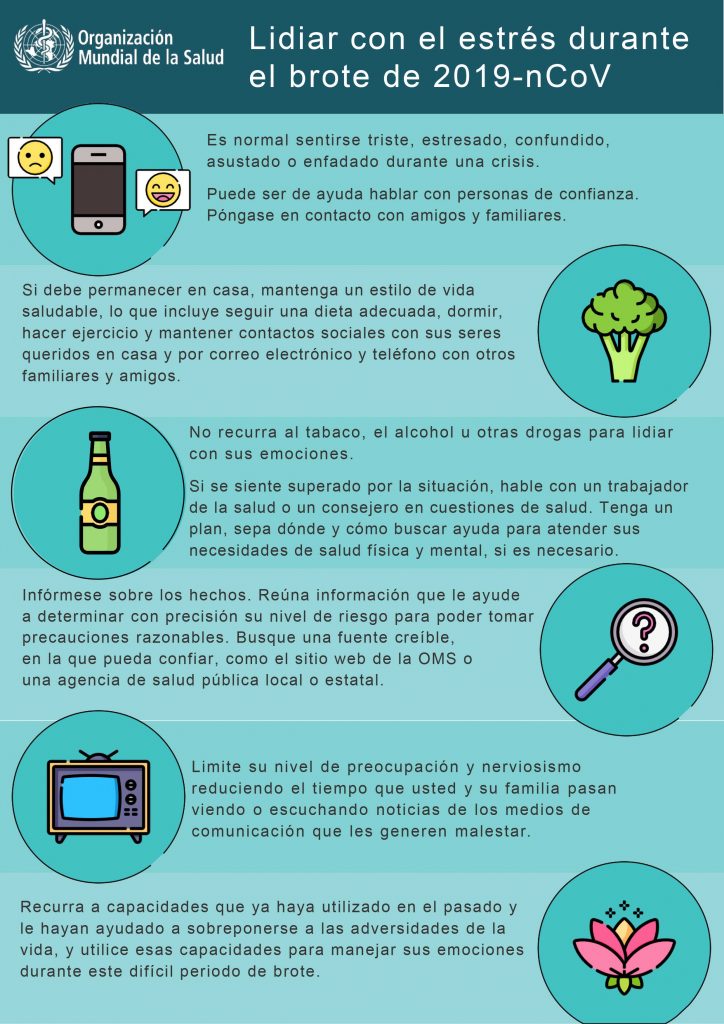In a previous post, we discussed some tips for reducing stress and being productive from home. We know that these are difficult times, so we stand with you with the best recommendations to stay physically and emotionally healthy. In this article we will address the issue of stress and anxiety in the days of COVID-19.
First, we want to limit that not all of us are equal and each person manages their feelings and sensations individually. Keep in mind that anxiety is a defensive mechanism against threatening situations or emotions. It is normal to feel anxious and stressed in the current situation of uncertainty generated by COVID-19. The important thing, is to understand that we are not alone and that there are people who have the same fears and emotions as you do right now.
Dr. Harriet Lerner, a psychologist investigating the effects of anxiety and fear in individuals, indicates 10 recommendations to alleviate anxiety and stress generated by COVID-19:
- Know the facts: Staying informed is important to have a real perspective of what is happening. You must deal with situations, even in difficult times, because anxiety increases and fantasies flourish in the absence of information. Remember that everything in excess is bad, too much information can aggravate stress.
- Put the pandemic in perspective: The current crisis is not the only stress factor that you are dealing with. There are personal problems of various kinds that may be affecting you. It is normal to feel overwhelmed, what we should avoid is labeling ourselves as “weak” or comparing ourselves with others. Furthermore, we must put into perspective what we should and should not do. We know that human beings have a deep need for physical connection and closeness, they do not, it is time to visit that friend or client in the office.
- Identify the sources of your anxiety: once we recognize that we have anxiety, we can explore its source. Some people could be generating stress due to concerns such as the threat of job loss, not getting medicine or supplies, lack of social contact, among others. Once the source is identified, we can move away from it a bit, in search of calming down enough to think of solutions, planes or just calm down a bit.
- Refrain from shaming and blaming: When anxiety breaks out in threatening situations, it is easy to blame others, forgetting that we are all going through the same thing. While we cannot completely eradicate our fears, we can work to understand how anxiety works and how it affects us, for better or for worse. Anxiety can be helpful when it points us to a problem and motivates us to come together to solve it.
- Don’t be afraid to ask for help: many people are going through the same thing as you, share your experience with friends, family or coworkers. We are here to help others. You can choose not to follow the advice they give you, but it is essential to have other perspectives. If you consider it necessary, consult an online specialist.
- Don’t put off preparing for the worst: Anxiety can push us to overreact or minimize the problem. Let us trust our ability to make the necessary changes in our routine, let us recognize where we must take precautionary measures and preparation with common sense.
- Connect, connect, connect: social distancing and the mandates to stay in our homes do not mean that we have to isolate ourselves from everything. It is essential to stay in communication with family, friends, neighbors, and coworkers. Use your phone, text messages, email, and all other possible means to stay connected.
- Practice self-pity: at this time, we should care about others, but also be kind to ourselves. Anxiety and fear are physiological processes that run our bodies and make us feel vulnerable. So, don’t be hard on yourself when you can’t disconnect from fear and pain, for everything that’s happening. Fear is not fun, but it indicates that we are fully human.
- Do not skip personal care: participate in healthy practices and try to maintain regular routines that provide comfort and stability. Therapy, conversation, exercise, meditation, and religious and spiritual practices are good starting points. Also spend your time in activities with healing effects such as art, crafts, singing, journaling, among others.
- Don’t let fear and anxiety turn into pandemics: In these stressful times, it is important to try to control your own anxiety and do everything possible not to pass it on to others. Never allow fear to lead us to isolation or prevent us from acting with clarity, compassion and courage.
Additionally, we show you an infographic from the World Health Organization (WHO) on tips to deal with stress during the COVID-19 outbreak.




